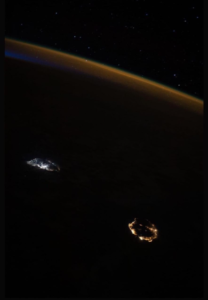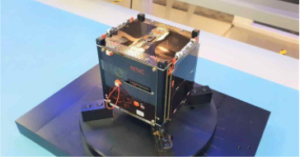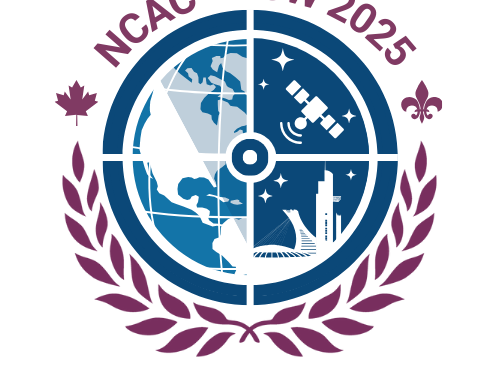Launch of the first Mauritian Satellite: MIR-SAT1
June 01, 2021 – 3 MIN READ
Note: This article is part of a series that will be published and updated by the authors accordingly

Contributor
Hansley is the National Point of Contact for the Space Generation Advisory Council (SGAC) In Support of the United Nations Programme on Space Application, Forbes 30 Under 30 for the Republic of Mauritius and currently works for the United Nations Office for Outer Space Affairs (UNOOSA).

Avishka Ferag & GIS (Government Information Service – Republic of Mauritius)
Adviser on Information Matters
Ministry of Information Technology, Communication, and Innovation. Republic of Mauritius

May 26, 2021 – The Earth’s colours, from the city lights to the hues of an orbital sunrise, show just how vivid our planet is when viewed from the space station. A night-time shot of Mauritius and Reunion Island in the Indian Ocean | Image Credit: International Space Station
The year 2021 marks a huge step forward in terms of space exploration for the island of Mauritius. In few days, on June 3rd 2021, at 17:29 UTC* (21:29 time in Mauritius GMT+4), the first Mauritian satellite (a CubeSat – MIR-SAT1) will be launched onboard the SpaceX Falcon 9 rocket (Mission: CRS-22/SpX-22) from the Kennedy Space Center in Florida.

CRS-22 (SpX-22) mission patch and SpaceX’s flight Launch

Image Credit: SpaceX
* Launch date, time, and viewing opportunities are subject to change. Launches can be affected by technical and mechanical issues and range operations and weather, either in advance or at the last minute.
The flight is the 22nd mission by SpaceX conducted under a Commercial Resupply Services contract with NASA. The Dragon cargo spacecraft will deliver supplies, science investigations, and an array of small satellites for deployment from the International Space Station (ISS). These small satellites, CubeSats (also known as ‘Nanosatellites’) are a class of research spacecrafts, can be 1U, 2U, 3U, or 6U in size, around 10 cm x 10 cm x 10 cm and typically weigh less than 1.33 kg per U.

First Mauritian Nanosatellite, MIR-SAT1 | Image Credit: Mauritius Research and Innovation Council (MRIC)
The Mauritius Imagery and Radiotelecommunication Satellite 1 (MIR-SAT1) was built by a team of researchers at the Mauritius Research and Innovation Council (MRIC), under the aegis of the Ministry of Information Technology Communication and Innovation. It was also supported by the local Amateur Radio Society in collaboration with experts from AAC-Clyde Space UK.

The United Nations/Japan Cooperation Programme on CubeSat Deployment from the International Space Station (ISS) Japanese Experiment Module (Kibo) “KiboCUBE” | Image Credit: UNOOSA/JAXA Partnership
In 2018, the United Nations Office for Outer Space Affairs (UNOOSA) and the Japan Aerospace Exploration Agency (JAXA) selected the Republic of Mauritius for the third round of the UNOOSA-JAXA KiboCUBE programme. Through this partnership, Mauritius will be able to launch their first Mauritian satellite 1-Unit Cube Satellite (nanosatellite) to the International Space Station (ISS) and then deployment in space from the Japanese Experiment Module (Kibo) of the International Space Station.

The main mission and objectives of the MIR-SAT1 are to enable “Technology and knowledge transfer through the design, building, testing and operating satellite in space.” This will help promote small satellite technology in Mauritius and contribute to socio-economic benefits.
Join us for the full launch on: SpaceX’s livestream or NASA’s livestream.
The Republic of Mauritius Government’s Official Launch Event will take place in the presence of the Prime Minister, Hon. Pravind Kumar Jugnauth in Mauritius.
Details about the Mauritius Research and Innovation Council (MRIC): http://www.mric.mu/English/Pages/default.aspx
More information about MIR-SAT1 can be found on: https://spacemauritius.com/




